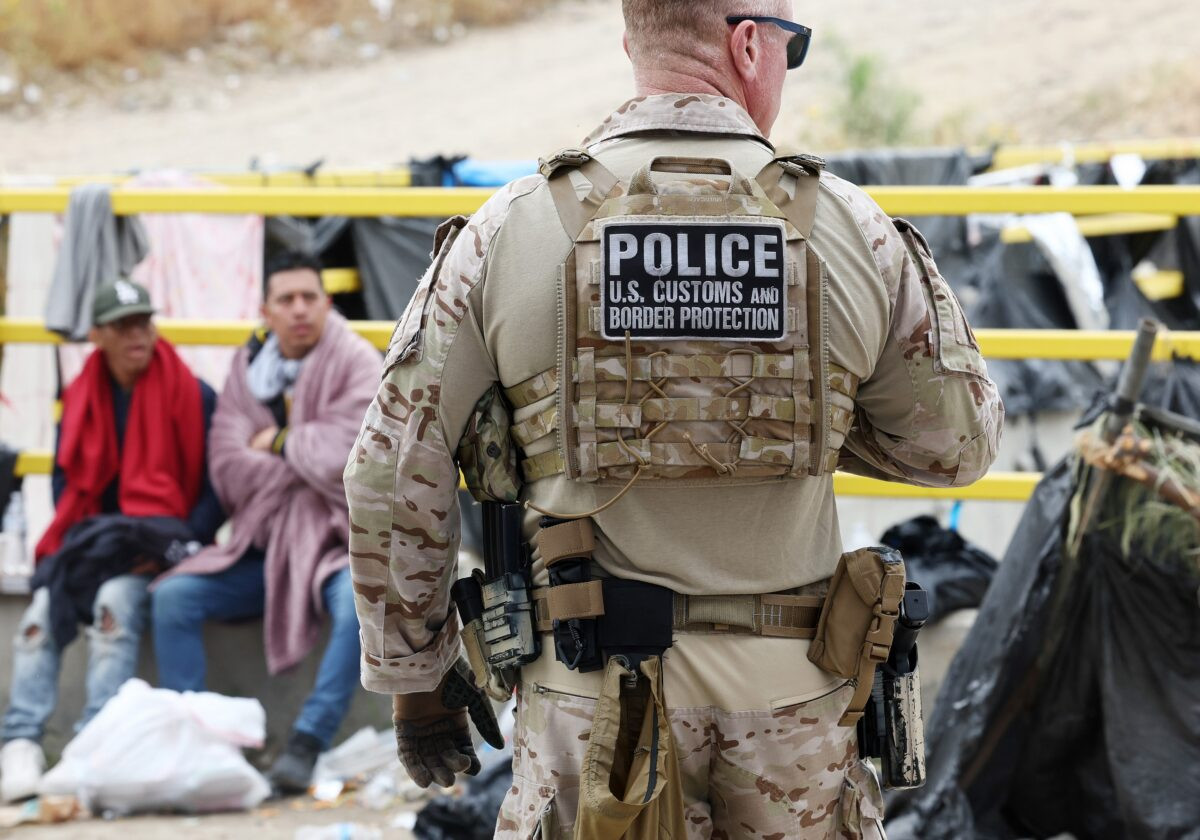

GUADALAJARA, MEXICO—The White House has been touting a drop in illegal immigration at the U.S.–Mexico border after Title 42 border restrictions ended last week. Still, sheriffs along the border have not been convinced the decrease in illegal crossings will last.
“Since May 12 the U.S. Border Patrol has experienced a steady decrease in daily encounters, with our daily average since May 12 just over 4,400 including less than 4,000 encounters each of the last two days. This represents a decrease of 56 percent or less than half of the average encountered in the lifting of Title 42 when the border patrol encountered an average of 10,100 individuals each day,” said Blas Nuñez-Neto, the assistant secretary for Border and Immigration Policy at the Department of Homeland Security (DHS) on Wednesday during a virtual press conference.
Title 42, a pandemic-era immigration policy, allowed U.S. Border Patrol agents to remove illegal immigrants on public health grounds and was anticipated to create a spike in illegal immigration when it expired. However, Nuñez-Neto said that spike never manifested as Title 8, a more restrictive immigration policy, was immediately put in place afterward.
Under Title 8, illegal immigrants who are captured and deported are banned from entering the United States for at least five years. And if they enter again illegally, they could face jail time.
But sheriffs along the U.S.–Mexico Border aren’t convinced that the decrease in illegal immigrant crossings will stick.
“We are always hopeful when anything happens along these lines. Are we looking [at] a continuation of this reduction [in illegal crossings]? We don’t know,” Clint McDonald, executive director of the Southwestern Border Sheriffs Coalition, told The Epoch Times. “I’m hearing from our sheriffs across the southwestern border that they are seeing reductions in the most major areas and we still have some rural areas that are staying steady. But we don’t know at this point that it will stay this way, we are hopeful but we’re not optimistic that it will.”
The Southwestern Border Sheriffs Coalition is composed of sheriffs from 31 counties along the U.S.–Mexico border from Texas to California. McDonald says many of his sheriffs are not optimistic that illegal immigrant crossings will continue to drop, due to past experience and because of a complete lack of transparency from the Biden administration with border sheriffs.
“The total lack of communication with Washington is one of the big issues we have, I realize that they are taking a victory lap about this but we don’t know what’s going on we are not in that loop,” he said. “This is the first administration I’ve worked with that I haven’t had someone inside the White House I could contact so we don’t know what’s going on we don’t have that first-hand information anymore so it’s hard to get a grasp on what’s happening.”
Despite the drop in illegal border crossings, Republican governors continue to criticize the Biden administration’s handling of the immigration crisis.
In a letter written to other governors on Tuesday, asking them to send additional law enforcement personnel to the border Texas Governor Greg Abbott argued the end of Title 42 would have been a lot worse if Texas did not deploy more ground forces to the border including a new tactical border unit and more National Guard troops.
“These efforts helped Texas hold the line against the influx of illegal crossings and criminal activity following the end of Title 42 expulsions, with widespread media coverage and recognition of our efforts in areas like Brownsville and El Paso. Even as the Biden Administration pulled Border Patrol agents off the line in areas like McAllen, the State of Texas held strong thanks to our brave, hardworking Texas National Guard soldiers and DPS troopers,” Abbott wrote.
“Without the historic efforts Texas has deployed to respond to President Biden’s derelictions of duty, the end of Title 42 expulsions would have been significantly worse. Because of Texas’ surge in border security strategies and resources, including miles of additional razor wire barriers, illegal border encounters decreased significantly from last week’s highs.”
In response to Abbott’s letter, 24 Republican governors pledged to support the efforts of Texas to secure the southwestern border.
“The federal government’s response, handling the expiration of Title 42, has represented a complete failure of the Biden Administration. While the federal government has abdicated its duties, Republican governors stand ready to protect the U.S.–Mexico border and keep families safe,” the governors said in a joint statement.
Florida Governor Ron DeSantis also announced he would be sending 1,100 law enforcement personnel to Texas to assist Abbott in securing the Texas–Mexico border.
“The impacts of Biden’s Border Crisis are felt by communities across the nation, and the federal government’s abdication of duty undermines the sovereignty of our country and the rule of law,” said DeSantis. “At my direction, state agencies including law enforcement and the Florida National Guard are being deployed to Texas, with assets including personnel, boats, and planes. While Biden ignores the crisis he created, Florida stands ready to help Texas respond to this crisis.”
Nuñez-Neto responded by saying the actions by Texas and Florida were motivated by political reasons and that DHS has not left border states to fend for themselves.
“There is outstanding coordination taking place at the local level each and every day. We have seen, however, at times that Gov. DeSantis and [Texas Gov. Greg Abbott] take actions that are being done really for purely political reasons and that do not involve the kind of coordination that we really need to see at the border,” he said.
The end of Title 42 may have created a political firestorm in the United States, but for migrants still making the journey to the U.S.–Mexico border it’s hardly been noticed.
“I still plan on going to Tijuana to see if I can make it into California,” Pedro Diaz, who crossed illegally from Guatemala into Mexico, told The Epoch Times in Guadalajara. “If they kick me out I will just go back and try again, many of us will do the same.”
Diaz said that he knows hundreds of Guatemalans that are planning or are already making the trip to the United States, sometimes in groups and sometimes alone.
“I always travel alone,” he said. “It is dangerous but I am doing this for my family and it is easier to move by yourself.”
When asked if he knew about Title 8 and how the U.S. border policies were now more restrictive Diaz responded by saying “they will let me back in, they let everyone in. It is known.”




Discount Applied Successfully!
Your savings have been added to the cart.